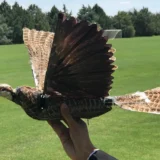Garland County Library patrons have one more chance to participate in the library’s astronomy series, but the library is partnering with NASA in April for four events leading up to the April 8 total solar eclipse for additional learning opportunities.
The library’s eight-part “Introduction to Astronomy” series started in August, and the final installment is set for 1 p.m. on Tuesday.
“It was an entire overview of astronomy basics, and as the series has progressed, it’s gotten more advanced,” Paul Kagebein, adult services specialist at the library, told The Sentinel-Record.
“It started with just basic beginner astronomy terms — what’s the definition of the sun, the stars, the moon — and in a recent part in the series, it got more complex to breaking down here’s how to use a telescope, here’s how to use Stellarium and sky maps and all these tools that help the beginner, and now intermediate, astronomers.”
The last session will be on the “Total Eclipse Preparedness Program,” and it will be free to the public and streamed on YouTube and Facebook, Kagebein said.
Video not playing? Click here https://www.youtube.com/embed/xD3bioDqbdI
“This one will do a deep dive specifically into the upcoming solar eclipse and what people can do from a viewer’s stance on how to prepare for it,” he said.
While the 1 p.m. event is not ideal for all patrons, making it available via livestream and afterward on both social media platforms has helped improve its reach.
“There’s never a sweet spot for library programs for adults because in the daytime, it’s a great time for people who are retired, for seniors,” Kagebein said. “If you do it in the evening, that’s not a great time for them. If someone’s coming from the Village, they may not want to drive out at night, but it’s a better time for working people. So there’s never a sweet spot where you’re going to get that entire audience, but it has had a great reception in attendance.”
He said there has been “steady attendance” for the monthly events, but “the number has shrunk” from the initial session.
“You have people who are really enthusiastic about it that want to learn more as these installments get a little more complex, but (there’s) still a steady attendance — a lot of regulars and each entry has had some new faces, as well,” he said. “I do expect this last one will spike back up since it’s focused on viewing the eclipse.”
On April 4 and 5, there will be two sessions each for adults and children, Kagebein said.
“Scientific Discoveries from Previous Eclipses” will be at 2 p.m. on April 4, and on April 5 at 1 p.m., they will host “GLOBE Observer and You,” which will discuss the GLOBE (Global Learning and Observations to Benefit the Environment) Observer app that individuals in over 120 countries use to provide scientific data for NASA and GLOBE Program scientists.
On Friday, April 5, at 10:30 a.m., there will be a program called “Bear Hugs and Cosmic Dances.”
“That’s targeted at ages 3-8, and then in the afternoon that same day, on that Friday, 4:30 p.m., there’s going to be paper spacecraft builds for ages 6 to 18,” he said. “So we’re doing four programs with NASA, the Thursday and Friday right before the eclipse.”
Kagebein said the library still has eclipse glasses for library patrons, although he encourages getting them soon.
“I would recommend people don’t wait until the day before the eclipse because we may not have them at that point, but if you were to come today, you can get a pair of eclipse glasses for you and each person in your household as long as you have a library card,” he said, noting they can also be picked up from the Bookmobile at any regular stop.
“So since we’re a distribution site for the free glasses, people have been calling us from all over the region outside of the state asking about eclipse info. Since we’re a library, people call and ask us questions, so it’s a perfect fit for everything we do.”












